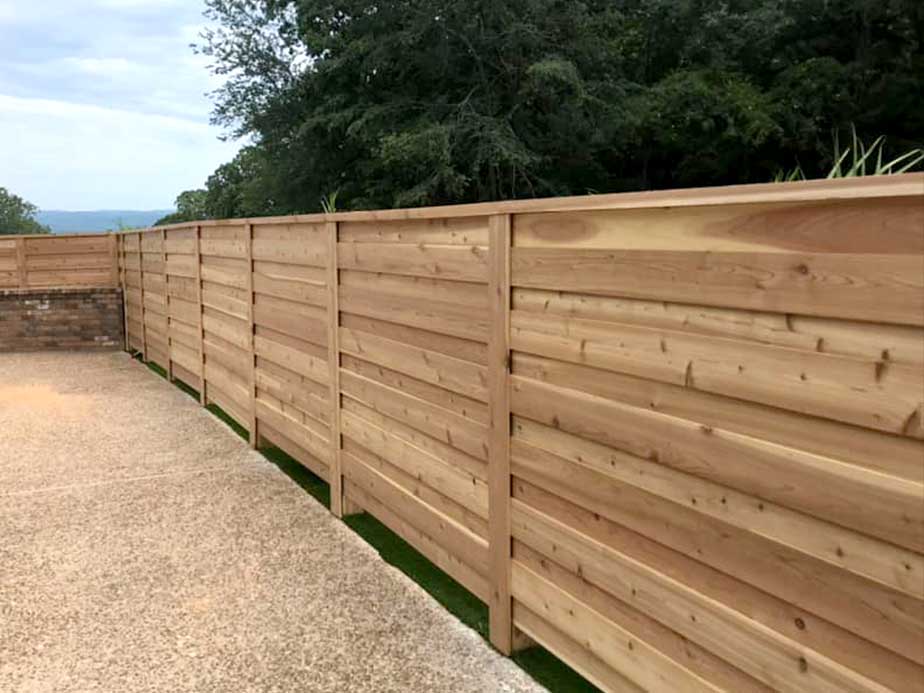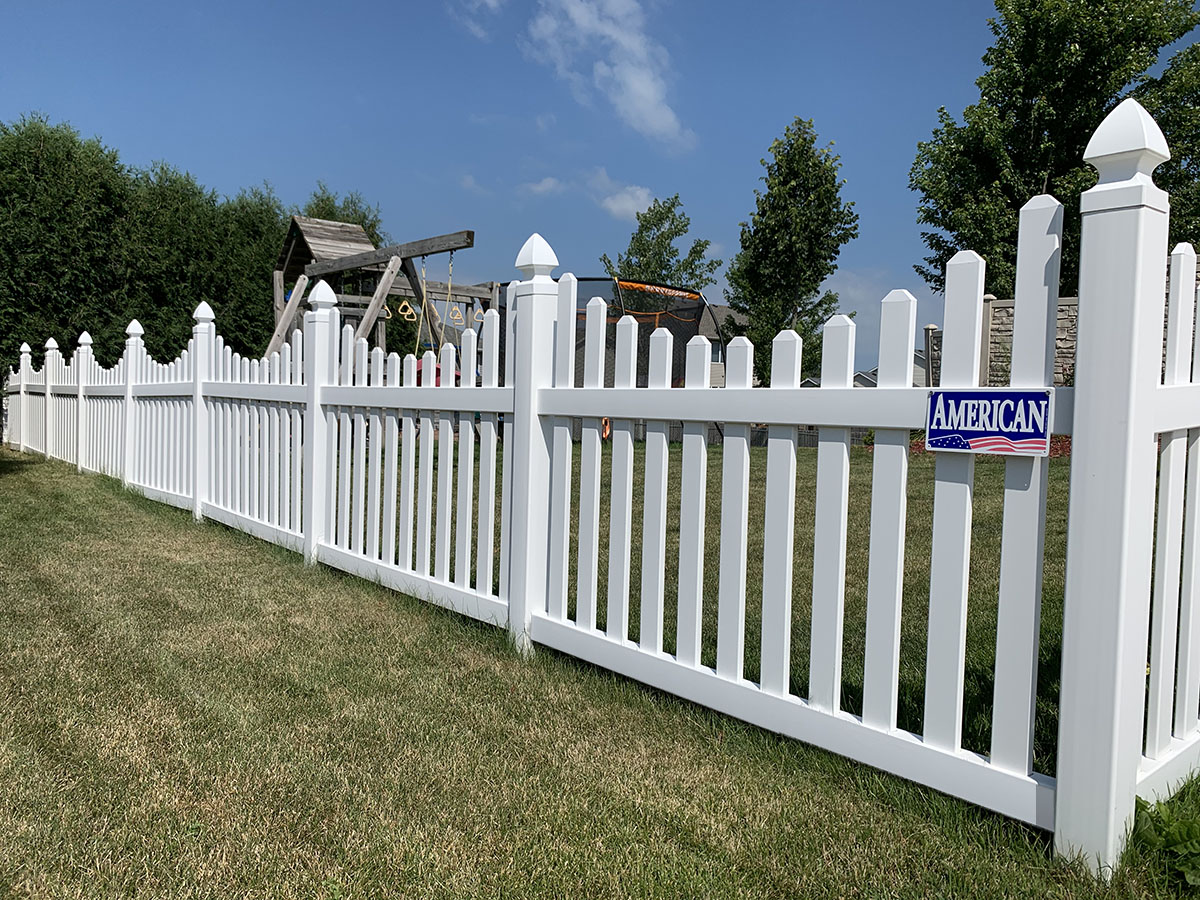All Categories
Featured
When picking a fence for your property, it's vital to consider elements like price, longevity, maintenance, and visual charm. 3 of the most prominent products for business and household fences are timber, aluminum, and vinyl.
Timber Fencing. Pros:
![]()
Natural Visual: Wood fencings are known for their timeless, natural appearance. They can easily mix right into the majority of landscapes and improve the charm of your home or service. Whether you're going for a rustic look or a more polished surface, timber can be tailored with paint, stain, or sealant. Customization: Wood is one of one of the most flexible materials, enabling a wide array of designs, such as picket fences, personal privacy fences, and ranch-style units. It's easy to readjust the design to fit the specific needs of your residential or commercial property. Budget friendly: Normally, wood fencings come at a reduced first cost contrasted to vinyl or light weight aluminum, making them an economical choice for those on a budget plan. Cons:
Maintenance Demands: Timber fencings need normal maintenance to preserve their charm and capability. This consists of staining or painting to shield against rot, termites, and weather condition damage. Without correct treatment, wood can deteriorate in time. Much Shorter Lifespan: Compared to plastic or aluminum, wood fencings tend to have a shorter lifespan, especially in locations with extreme climate. Extreme conditions, such as hefty rain, moisture, or snow, can trigger timber to degrade much more rapidly. Prone to Damage: Wood fences are prone to harm from pests, including termites, in addition to natural wear from weather. They might additionally warp or fracture if not correctly kept. Plastic Fencing. Pros:
Reduced Upkeep: Among the major advantages of plastic fencings is that they need minimal upkeep. Unlike wood, plastic doesn't require to be painted, secured, or tarnished. It's resistant to fading, discoloration, and fracturing, which saves time and cash on upkeep. Resilience: Vinyl is understood for its capacity to endure extreme weather condition problems without weakening. It's resistant to parasites like termites, and its resistance to wetness and UV rays guarantees it stays looking helpful for years. Long-Lasting: A vinyl fence can last up to three decades or more, making it an excellent long-lasting financial investment. Numerous producers supply guarantees, even more enhancing its value. Variety of Styles: Vinyl fences are available in various shades and styles, consisting of those that resemble wood. You can select from personal privacy, picket, or attractive designs, supplying versatility to match your home or service. Cons:
![]()
Greater Upfront Cost: Plastic fencings tend to have a greater initial price than timber. While the long-term savings on maintenance are significant, the upfront investment might be a deterrent for some homeowners. Limited Modification: Plastic fencings can be found in common layouts, and while colors and designs are diverse, you may not have as much versatility for modification contrasted to timber. Breaking in Cold Climates: While vinyl is durable, in extremely cool climates, it can end up being brittle and fracture upon influence, which might be bothersome in areas with extreme wintertimes. Light weight aluminum Fence. Pros:
Reduced Maintenance: Aluminum fences are known for their low-maintenance requirements. Unlike timber, aluminum does not corrosion or rust, and it does not need to be painted or sealed. This makes it a wonderful choice for those that desire a hassle-free option. Resilience and Stamina: Aluminum is a robust material that stands well to severe weather condition conditions. It's a superb choice for coastal locations where saltwater corrosion is an issue, as it's immune to rust. Visual Appeal: Light weight aluminum fencings provide a tidy, sophisticated appearance, frequently made use of for decorative functions. They're readily available in different designs, consisting of decorative layouts, and can add a premium feeling to your residential or commercial property. Protection: Light weight aluminum fencings are resilient and deal great protection, especially when installed with entrances or locks. Their strong building and construction gives a trustworthy barrier versus undesirable entrance. Cons:
![]()
Higher First Price: Light weight aluminum fences often tend to be a lot more expensive than timber, specifically if you choose attractive layouts. The upfront expense might be too high for some. Much Less Privacy: Aluminum fences commonly have broader spaces between the slats, which indicates they provide much less privacy than wood or vinyl fencings. If privacy is a concern, light weight aluminum might not be the most effective alternative. Denting Problems: While aluminum is rust-resistant, it is prone to denting or flexing if struck with force. A car crash or hefty influence can trigger lasting damages to the fencing. Which Fence Product is Right for You? Picking the best fence depends on numerous factors, including your spending plan, design preferences, maintenance ability, and the environment in which you live. If you want an all-natural look and are prepared for regular upkeep, wood could be the right option.
Eventually, each fence product has its benefits and drawbacks, so it is essential to assess what matters most for your details needs. Take into consideration the climate, the level of privacy you call for, and how much maintenance you agree to dedicate to, and you'll locate the excellent fencing for your property.
Timber Fencing. Pros:

Natural Visual: Wood fencings are known for their timeless, natural appearance. They can easily mix right into the majority of landscapes and improve the charm of your home or service. Whether you're going for a rustic look or a more polished surface, timber can be tailored with paint, stain, or sealant. Customization: Wood is one of one of the most flexible materials, enabling a wide array of designs, such as picket fences, personal privacy fences, and ranch-style units. It's easy to readjust the design to fit the specific needs of your residential or commercial property. Budget friendly: Normally, wood fencings come at a reduced first cost contrasted to vinyl or light weight aluminum, making them an economical choice for those on a budget plan. Cons:
Maintenance Demands: Timber fencings need normal maintenance to preserve their charm and capability. This consists of staining or painting to shield against rot, termites, and weather condition damage. Without correct treatment, wood can deteriorate in time. Much Shorter Lifespan: Compared to plastic or aluminum, wood fencings tend to have a shorter lifespan, especially in locations with extreme climate. Extreme conditions, such as hefty rain, moisture, or snow, can trigger timber to degrade much more rapidly. Prone to Damage: Wood fences are prone to harm from pests, including termites, in addition to natural wear from weather. They might additionally warp or fracture if not correctly kept. Plastic Fencing. Pros:
Reduced Upkeep: Among the major advantages of plastic fencings is that they need minimal upkeep. Unlike wood, plastic doesn't require to be painted, secured, or tarnished. It's resistant to fading, discoloration, and fracturing, which saves time and cash on upkeep. Resilience: Vinyl is understood for its capacity to endure extreme weather condition problems without weakening. It's resistant to parasites like termites, and its resistance to wetness and UV rays guarantees it stays looking helpful for years. Long-Lasting: A vinyl fence can last up to three decades or more, making it an excellent long-lasting financial investment. Numerous producers supply guarantees, even more enhancing its value. Variety of Styles: Vinyl fences are available in various shades and styles, consisting of those that resemble wood. You can select from personal privacy, picket, or attractive designs, supplying versatility to match your home or service. Cons:

Greater Upfront Cost: Plastic fencings tend to have a greater initial price than timber. While the long-term savings on maintenance are significant, the upfront investment might be a deterrent for some homeowners. Limited Modification: Plastic fencings can be found in common layouts, and while colors and designs are diverse, you may not have as much versatility for modification contrasted to timber. Breaking in Cold Climates: While vinyl is durable, in extremely cool climates, it can end up being brittle and fracture upon influence, which might be bothersome in areas with extreme wintertimes. Light weight aluminum Fence. Pros:
Reduced Maintenance: Aluminum fences are known for their low-maintenance requirements. Unlike timber, aluminum does not corrosion or rust, and it does not need to be painted or sealed. This makes it a wonderful choice for those that desire a hassle-free option. Resilience and Stamina: Aluminum is a robust material that stands well to severe weather condition conditions. It's a superb choice for coastal locations where saltwater corrosion is an issue, as it's immune to rust. Visual Appeal: Light weight aluminum fencings provide a tidy, sophisticated appearance, frequently made use of for decorative functions. They're readily available in different designs, consisting of decorative layouts, and can add a premium feeling to your residential or commercial property. Protection: Light weight aluminum fencings are resilient and deal great protection, especially when installed with entrances or locks. Their strong building and construction gives a trustworthy barrier versus undesirable entrance. Cons:

Higher First Price: Light weight aluminum fences often tend to be a lot more expensive than timber, specifically if you choose attractive layouts. The upfront expense might be too high for some. Much Less Privacy: Aluminum fences commonly have broader spaces between the slats, which indicates they provide much less privacy than wood or vinyl fencings. If privacy is a concern, light weight aluminum might not be the most effective alternative. Denting Problems: While aluminum is rust-resistant, it is prone to denting or flexing if struck with force. A car crash or hefty influence can trigger lasting damages to the fencing. Which Fence Product is Right for You? Picking the best fence depends on numerous factors, including your spending plan, design preferences, maintenance ability, and the environment in which you live. If you want an all-natural look and are prepared for regular upkeep, wood could be the right option.
Eventually, each fence product has its benefits and drawbacks, so it is essential to assess what matters most for your details needs. Take into consideration the climate, the level of privacy you call for, and how much maintenance you agree to dedicate to, and you'll locate the excellent fencing for your property.
Latest Posts
Discover Reduce Expenses on Car Maintenance with Montclare Auto Repair’s Limited-Time Deals
Published en
1 min read
Explore Auto Services & More: Complete Auto Care Solutions from Montclare Auto Repair
Published en
1 min read
Check Out Exceptional Auto Repair Care from Montclare Auto Repair – Quality Service Today
Published en
1 min read
More
Latest Posts
Discover Reduce Expenses on Car Maintenance with Montclare Auto Repair’s Limited-Time Deals
Published May 30, 25
1 min read
Explore Auto Services & More: Complete Auto Care Solutions from Montclare Auto Repair
Published May 27, 25
1 min read
Check Out Exceptional Auto Repair Care from Montclare Auto Repair – Quality Service Today
Published May 26, 25
1 min read